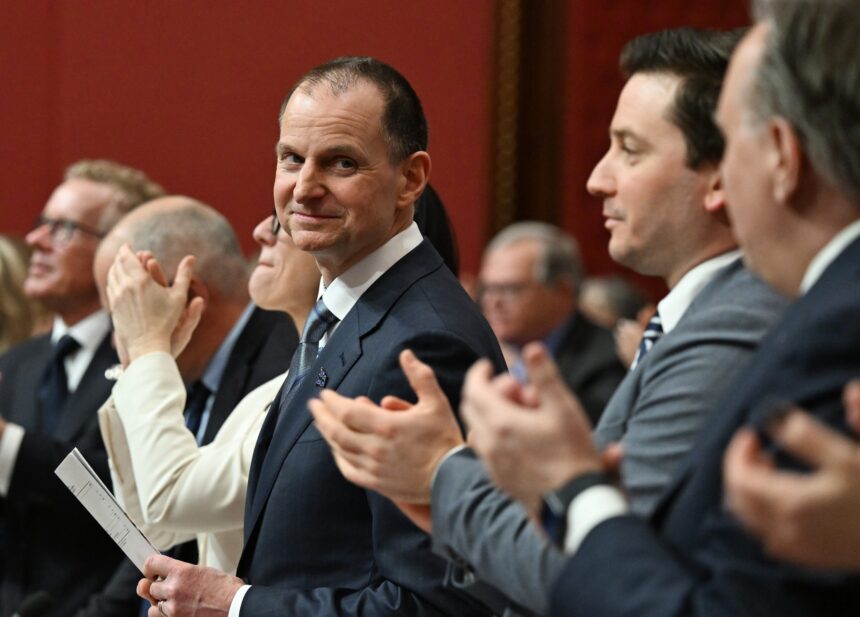Quebec’s financial outlook brightened considerably this week as Finance Minister Éric Girard announced the province’s deficit for fiscal year 2024 stands at $2.8 billion – a substantial $3.2 billion improvement over previous forecasts. This unexpected financial reprieve offers a moment of relief amid Quebec’s ongoing economic challenges.
“We’ve managed to contain spending while experiencing stronger-than-anticipated revenue growth,” Girard explained during yesterday’s press conference at the National Assembly. The minister, visibly pleased with the results, credited prudent fiscal management and Quebec’s surprisingly resilient economic performance during a period many economists had predicted would bring harsher economic conditions.
The improved numbers represent a significant departure from the $6 billion deficit projected in last year’s budget announcement. According to Girard, this positive shift stems primarily from two factors: higher-than-expected tax revenues and disciplined control of government expenditures across several ministries.
This financial turnaround comes at a crucial time for Quebec. Walking through Old Montreal yesterday afternoon, I noticed how the atmosphere has subtly shifted. Store owners along Rue Saint-Paul, who last summer expressed deep concerns about economic uncertainty, now speak with cautious optimism. Marc Tremblay, owner of Boutique Montréal Élégance, shared his perspective: “We’re still careful with inventory, but customer confidence seems to be improving. Perhaps this budget news reflects what we’re beginning to see on the ground.”
The Chamber of Commerce of Metropolitan Montreal welcomed the improved financial position. “This gives businesses more confidence in Quebec’s economic stability,” said Michel Leblanc, the organization’s president. “However, we still face significant challenges in addressing labor shortages and improving productivity.”
Experts from HEC Montréal suggest the deficit reduction might also reflect delayed spending on major infrastructure projects rather than fundamental economic improvement. “We need to examine whether this is simply postponed spending that will eventually appear on future balance sheets,” noted economist Marie Bouchard in her analysis published yesterday.
The government maintains that the improved financial position will allow Quebec to avoid the deep service cuts many had feared. Healthcare spending, which experienced intense pressure during the pandemic years, will continue as planned, according to Health Minister Christian Dubé.
What does this mean for ordinary Montrealers? The immediate impact may be minimal, but the long-term implications could be significant. On my morning metro ride, I overheard conversations suggesting public relief that services might be preserved. For families in neighborhoods like Rosemont and NDG, concerns about potential cuts to education and family programs have been particularly acute.
Quebec’s improved fiscal position stands in contrast to some other Canadian provinces. Ontario recently reported its deficit had grown to $9.7 billion, while Alberta continues to benefit from energy revenues, posting a $5.2 billion surplus.
Critics, however, question whether the CAQ government will use this financial breathing room wisely. Opposition leader Gabriel Nadeau-Dubois of Québec Solidaire called for investments in affordable housing: “With thousands of Montrealers struggling to find affordable apartments, this unexpected financial margin should be directed toward solving the housing crisis.”
The Parti Québécois expressed similar sentiments, arguing for increased spending on environmental initiatives and support for Quebec’s cultural sector, which continues to recover from pandemic-related disruptions.
Despite the improved numbers, Quebec’s overall debt remains substantial at approximately $215 billion. The province’s debt-to-GDP ratio, while improving slightly to 39.8%, continues to rank among the highest in Canada.
Finance Ministry officials indicate the government plans to present a detailed update on Quebec’s economic outlook next month, which should clarify whether this deficit reduction represents a temporary improvement or the beginning of a more sustainable fiscal trend.
As someone who has covered Quebec’s economic cycles for nearly two decades, I’ve observed how these financial announcements often create ripples through Montreal’s diverse communities. In Little Italy this morning, café conversations reflected both relief and skepticism – a typically Québécois mixture of pragmatism and caution about government announcements.
For now, Quebec’s improved financial position offers a welcome respite from the economic anxiety that has characterized much of the post-pandemic period. Whether this represents the beginning of a sustained recovery or merely a temporary reprieve remains to be seen, but for the moment, Quebec can breathe a bit easier.







